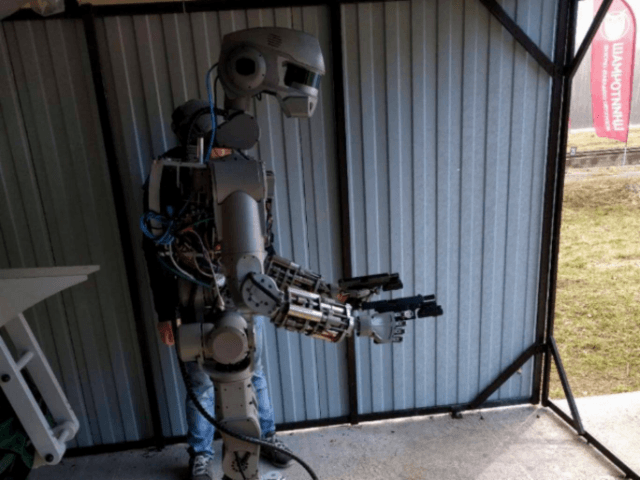WASHINGTON, DC — China has developed a plan to “overtake” the United States in the race to militarize artificial intelligence, robotics, and quantum computing, an expert from the Center for Strategic and International Studies (CSIS) warned lawmakers, noting that the communist nation is “rapidly closing the gap” with America.
In written testimony prepared for a hearing held Tuesday by the House Armed Services Subcommittee on Emerging Threats and Capabilities, William Carter, the deputy director for CSIS’ technology policy program, said:
China sees offensive cyber capabilities, anti-satellite weapons, electronic warfare tools, hypersonic weapons, artificial intelligence, and quantum technologies as key to enabling the PLA [People’s Liberation Army] to win wars in future, high-tech conditions and offset the advantages of the U.S. military, and has made significant strides in all of these areas.
Specifically, China is already able to “significantly disrupt, degrade, and even destroy the ICT [information and communication technology] infrastructure on which our military depends,” namely satellites, Carter told lawmakers, suggesting that by doing so Beijing could essentially take down the American armed forces.
“We may have more and better aircraft carriers, tanks, and missiles than the PLA, but without access to data and connectivity many of these systems are ineffective or even inoperable,” warned the CSIS expert.
He went on to note that China considers satellites to be the U.S. military’s “Achilles heel,” adding:
The PLA has tested a range of anti-satellite weapons, including conventional ground-based kinetic kill vehicles, directed energy weapons, jamming and spoofing capabilities, and “kill-satellites” designed to disable or destroy other satellites on orbit.
They have expanded their electronic warfare capabilities, testing their capabilities to jam radar and communications and spoof GPS systems. China has also developed some of the most sophisticated offensive cyber capabilities in the world.
China is catching up and perhaps even surpassing the U.S. military’s technological capabilities, cautioned Carter.
Beijing has “developed a national strategic plan—in fact, many of them—to overtake us in the race to dominate these new technologies, and are rapidly closing the gap in innovation, deployment, and militarization of these new systems with the U.S.”
Carter identified the “new technologies” as “artificial intelligence and robotics, miniaturization and ubiquitous connectivity, and quantum computing.”
“China’s strategy is not just to exploit the weaknesses in our military technology but to develop their own innovative, dynamic high technology sector to dominate the next generation of civilian and military technologies, particularly AI,” he said. “They seek to leverage both commercial and military innovation in ways that complement each other and build both military and economic power.”
He notes that China is investing heavily and focusing on advancing its technological base to dominate the systems of the future.
“In particular, China sees artificial intelligence (AI) and quantum as foundational to both economic and military competitiveness in the long term, and has become not just a copycat or adopter of these technologies, but an innovator in its own right,” notes Carter.
China is already capable of giving the United States a good run for its money in the AI domain, revealed the expert, noting that the competition between the two countries “has become neck-and-neck.”
In the quantum field, China may have already exceeded America’s capabilities, testified Carter.
Meanwhile, America’s quantum abilities are “murky” given that most of the research is classified, noted the expert.
“However, a number of U.S. researchers have recently noted that the U.S. seems to be lagging, owing primarily to the comparative willingness of the Chinese government to aggressively fund new quantum initiatives,” he added.
Carter urged the United States to develop a national strategy of its own to counter China’s technological advances and invest more money in maintaining a strategic advantage.
“China’s short-term strategy is to exploit the U.S. military’s weaknesses and exert constant pressure to undermine us,” he said, adding, “China’s offensive cyber capabilities should be of greatest concern to us in the short term because they are being used against us every day to strengthen China’s strategic position in incremental ways.”
The Pentagon “should invest in the next generation of combat systems that leverage the full potential of AI, including the potential future development of lethal AI systems that can operate without humans in the loop,” also said Carter.
“Russia, Iran and North Korea, among others, see the same weaknesses and vulnerabilities in our approach to national security that the Chinese do,” he noted. “To appropriately manage the range of threats the U.S. faces, we must focus not just on ‘beating China,’ but on increasing our strength and agility across the technological domain.”

COMMENTS
Please let us know if you're having issues with commenting.